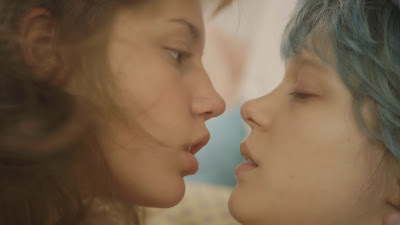From February 2013.
The film centers on Jocelyne (Adèle Exarchopoulos), who is 15 years old and is certain of two things: she is a girl and girls go out with boys. On the day in which she spots Emma's (Léa Seydoux) blue hair in the Grand Place, she senses that her life is about to change. Facing these teenage troubles on her own, she transforms the way she looks at herself and the way that others see her. Through her 'fusional' love story with Emma, she gains fulfilment as a woman, and as an adult. But Jocelyne is unable to make peace, neither with her parents, nor with the world full of absurd moralities, nor with herself...
As LA VIE D'ADÈLE CHAPITRES 1&2, The Palme D'Or Winner.
Editor’s note: This was written in the days after the
film won the Palme D’Or and in the middle of the controversy post winning the
award. I had obviously not seen the film.
About Gender
and Female Representation:
Here, here, here and here and here, you had plenty to read about the film. Including Julie Maroh's declaration.
The fact is
that anyone and anything varies with everything. This is super confusing.
Gender is really a huge, huge complex issue, though it should be quite simple.
My first
thoughts about the differences between male and female responses to something,
in this case, a film, was that my response to a film like Blue or My Own Private Idaho
won't be the same as a 45 year old woman or a 18 year old gay guy. I think this
is the stronger tendency. My reactions to Nebraska
will vary; they won't be the same as of a 55 year old man. And this goes on for
any kind of film and any kind of theme and age involved. Again, my reaction to
Blue compared to a 45 year old woman might be quite different; this woman could
be way more interested in seeing a coming of age story of a 45 year old woman
realizing her homosexuality and such.
[...]
This idea
that a director, a male director, has not the legitimacy, so to speak, to do
something like this - My idea is that Abdellatif Kechiche made his own
interpretation of a relationship, in this case between two women. It's his way.
Based in his own ideas of a relationship of that sort, based in his own ideas
and ideals, experiences, tastes. Like I will base my own opinion.
I make my
own interpretations based on my ideas, my life experiences and my own thoughts on love, which is different from Julie Maroh. Here's what I wanted to reach - It
is not because she's a lesbian or because he's not, it's because they have a
personality. So now, should this be a legit reasoning?
[...]


No comments:
Post a Comment